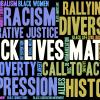Impulse is a community newsletter produced by the Northern California Society for Psychoanalytic Psychology (NCSPP) and distributed electronically at no cost to subscribers. We envision Impulse as an integrative source for local news, events, and thinking of interest to the psychoanalytically inclined. Our goal is to be your guide as you explore the Bay Area's rich array of analytic resources.
We invite you to become a member of NCSPP, if you are not already. And, we welcome you as a subscriber to Impulse. Join us as we highlight the exceptional diversity of psychoanalytic thought and practice in Northern California.
NCSPP's June edition of Impulse, intended to be distributed on June 1st, had been delayed by unfortunate technological issues. While the content of the June issue was compiled through mid-May, we are making use of this delay to also include NCSPP's recently issued Statement in Support of Black Lives.
Impulse will be focusing July's edition on themes relevant to the Movement for Black Lives, anti-oppression, and structural racism. Please direct any feedback or questions to dbiondini@ncspp.org.
 NCSPP is committed to inclusion, antiracism and anti-oppression. Police brutality and other systematized abuses are unacceptable. Our organization is committed to calling out, recognizing and OPENLY condemning all violence against Black and Brown people. We are also committed to not turning away from the reality of White supremacy, the continuous trauma that has been enacted, and the hold it has had on this nation for hundreds of years. Neutrality is not a viable option. We, as a board and organization, stand firmly in our belief that Black lives matter and Black voices matter.
NCSPP is committed to inclusion, antiracism and anti-oppression. Police brutality and other systematized abuses are unacceptable. Our organization is committed to calling out, recognizing and OPENLY condemning all violence against Black and Brown people. We are also committed to not turning away from the reality of White supremacy, the continuous trauma that has been enacted, and the hold it has had on this nation for hundreds of years. Neutrality is not a viable option. We, as a board and organization, stand firmly in our belief that Black lives matter and Black voices matter.
NCSPP will continue to fine tune our equity clause and prioritize coursework that highlights marginalized communities and encourages our members to work on antiracism and anti-oppression. We pledge to move forward to support communities of color. While this statement is the bare minimum, we are devoted to digging in and dismantling the White supremacist structures that dominate our organization. We also dedicate ourselves to ongoing self-inquiry as psychoanalytic theorists and practitioners in critically investigating the under-named biases in the history, theory, and practice of psychoanalysis. NCSPP will show up in solidarity with the Black community. We hear you, we are with you and we will not give up.
by Danni Biondini, LMFT
 A little moment of inspiration for us all: If Freud could get through the 1918 Spanish flu by working from home, so can we.
A little moment of inspiration for us all: If Freud could get through the 1918 Spanish flu by working from home, so can we.
As we move mid-way into Gemini season, our new normal shifts again. States are easing restrictions and some therapists are planning when to return to the meatspace. Enough with the digital meetspace: we want flesh-filled rooms. We’ll take precautions: hand-stitched face masks will be the therapist’s new drapey scarf.
But [to be read in a Carrie Bradshaw voice], as the country opens back up from shutdown, I can’t help but wonder: in what ways are we still psychologically shut down?
Speaking for myself and most likely all of you, when we were suddenly plunged into a pandemic and had to let go of our usual defenses-against-feeling-anything-at-all, I plunged into a depresh. The sadness seemed like it was just chilling there, waiting for the moment my hypomania would falter.
by Kara Swedlow, Psy.D.
PINC’s Community Psychoanalysis Track is hiring a P/T Coordinator. The CPT is an educational opportunity for psychoanalytic candidates seeking certification in psychoanalysis at the Psychoanalytic Institute of Northern California). The CPT allows current PINC candidates to substitute a one year, 50-hour analytic training case required by PINC with a collaboratively constructed project in a community mental health agency.
Some job duties include:
Attend and organize meetings; maintain and track running budgets; generate reports to the board and funders; project-based research; academic course coordination; delegate work and manage various deadlines and communications between constituencies and institutions; coordinate with PINC administrative office.
by Amber Trotter, Psy.D.
FEAR OF A BREAKDOWN THAT HAS ALREADY HAPPENED
As an Environmental Science major in 2002, I remember thinking: “We’re fucked.” Ecological collapse, war in Iraq, erosion of the middle class and welfare state and rampant inequality, profound mistrust of science and government, defunct progressive politics, intensifying automation — and little grounds for optimism about course correction. I switched to social psychology.
Like Jesus (“forgive them, for they know not what they do”), Marx points to the damaging effects of human ignorance (“they do not know it, but they are doing it”). As Zizek observes, however, ideology doesn’t function like a pair of sunglasses: take them off and, violà, we’re free. In our cynical era, we know very well what we are doing, but we do it anyway. What we misrecognize is why. We fail to correctly diagnose the structural and ideological forces that continually construct reality as we know it. Ideology functions not to protect us from reality, but to protect reality from its traumatic core.
by Molly Merson, MFT
Learning from the Virus. This article takes up Biopolitics with a Foucauldian lens: “Tell me how your community constructs its political sovereignty and I will tell you what forms your plagues will take and how you will confront them.”
Fuck The Bread. The Bread Is Over. This is a gorgeous, despairing, heartbreaking, and relatable piece about loss and life and going on being. It doesn’t mention psychoanalysis, but what can be more psychoanalytic than the journey on which Sabrina Orah Mark takes us?
Hero of the Day: Psychologist connects families to ailing loved ones. While there is a lot to unpack around the concept of a “hero,” Jamieson Webster uses her position and expertise (and courage) to connect those hospitalized, dying from COVID-19 related complications, with their families and loved ones — who are not allowed to set foot in the hospital room.
by Todd Rising, Psy.D.
LOVE, LOSS, AND LOST LOVE: Building Capacities for Loving, Losing, and Growing
This introductory event to the year-long San Francisco and East Bay intensive study groups (ISG) will explore ways to work with patients on the development and absence of capacities for love and its loss. Join us for an informal, dynamic conversation with a selection of our 2020-21 ISG instructors! If you’re considering registering for the fall ISG, this is an opportunity to bring your questions and comments into the conversation with the instructors.
This year's intensive study groups will investigate theoretical approaches and practical engagements with love and loss in the clinical setting. Topics include unremitting depressive states, developmental and intergenerational transmission of trauma, the impact of cultural hegemony on issues of depression and anxiety, enhancing patients’ positive community-affiliations, and the social construction of “otherness.” These discussions will contribute to participants’ understanding of the cultural contexts surrounding their clinical work.
BRIGHT, TOP FLOOR OFFICE. In the courtyard side of the Flood building, with waiting room, available full-time. Please contact Pirouz Ganji, Psy.D. at pirouzganji@gmail.com for photos and pricing.
TWO HALF-TIME OFFICE SUBLETS AVAILABLE. Located in Oakland and Campbell. Photos available upon request. The Campbell office is situated in a suite with several colleagues, multidisciplinary and collaborative, with weekly staff meetings; especially good opportunity to build a practice. Contact Christina Halsey, Ph.D. at 2chirp@comcast.net or (510) 418-0170.
Old couches, new books, hot jobs, cool internships, office rentals? List them in Impulse's Classifieds for a modest fee. Please see our submission guidelines for details.
ISG Introductory Event: Love, Loss, and Lost Love
Sat, Jul 18 / 11:30 am - 1:30 pm / Virtual Event
NCSPP / (415) 484-8627 / Deborah Melman, Ph.D., et al. / $20 - $40

